Ketone measurement has become an essential tool for those following a ketogenic diet, managing certain health conditions, or optimizing athletic performance. With many devices on the market, choosing the right ketone measurer can be overwhelming.
This comprehensive review explores the top 10 ketone measuring devices, examining their features, advantages, drawbacks, and overall performance to help you make an informed decision.
*As an Amazon Associate, I earn commission from qualifying purchases, but at no additional cost to you*
Ketone measurement serves several crucial purposes:
Why Measure Ketones?
- Confirming nutritional ketosis
- Optimizing diet for improved results
- Tracking metabolic flexibility
- Monitoring therapeutic ketosis for medical conditions
- Enhancing athletic performance
Factors to Consider When Choosing a Ketone Meter
When selecting a ketone measurer, keep these key factors in mind:
- Accuracy and consistency
- Measurement method (blood, breath, or urine)
- Cost of device and ongoing test strips
- Ease of use and portability
- Additional features (glucose testing, data tracking, etc.)
- Battery life and durability
- Customer support and warranty
Top 10 Ketone Meters
Now, let’s dive into our top 10 ketone measurers, ranked based on user feedback, performance, and overall value.
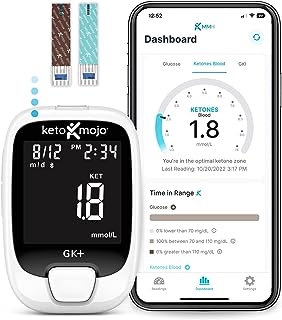
Pros:
- Highly accurate blood ketone and glucose measurements
- Large, easy-to-read display
- Bluetooth connectivity for seamless data tracking
- Affordable test strips compared to competitors
- Excellent customer support
Cons:
- Requires blood samples, which may be uncomfortable for some users
- Initial cost of the device is relatively high
Keto-Mojo stands out for its precision and reliability. The Bluetooth connectivity allows users to sync readings with a smartphone app, making progress tracking effective.
The dual functionality for measuring both ketones and glucose provides a comprehensive view of metabolic health.
The device’s accuracy is particularly noteworthy, with many users reporting consistent results that align closely with laboratory tests. The large display is easy to read, even for people who have vision impairments, and the intuitive interface makes testing a breeze.
While the initial cost of the Keto-Mojo device may be higher than some competitors, the affordable test strips help offset this expense over time. The company’s commitment to customer support is evident in their responsive service and helpful resources, including detailed guides and video tutorials.
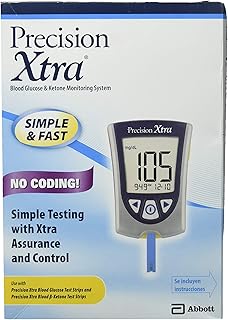
A well-established name in diabetes management, the Precision Xtra has earned its reputation as a reliable ketone and glucose meter.
Pros:
- Highly accurate blood ketone and glucose measurements
- Well-established brand with a long history
- Large, easy-to-read display
- Stores up to 450 test results
Cons:
- Expensive test strips
- No Bluetooth connectivity
- Bulkier design compared to newer models
The Precision Xtra’s strength comes from its proven track record and accuracy. While it may lack some modern features found in newer devices, its reliability makes it a top choice for those who prioritize consistent, trustworthy results.
Healthcare professionals often recommend the Precision Xtra because of its clinical-grade accuracy. The device’s ability to store up to 450 test results is particularly useful for those who need to track their ketone levels over extended periods.
The main drawback of the Precision Xtra is the cost of its test strips, which can be significantly higher than those of newer competitors. However, many users find that the device’s reliability and accuracy justify the ongoing expense.
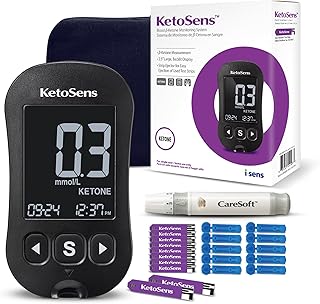
KetoSens offers a compact and affordable option for those new to ketone testing or looking for a budget-friendly device.
Pros:
- Compact and portable design
- Quick results in just 5 seconds
- Measures both ketones and glucose
- Affordable test strips
Cons:
- Limited data storage capacity
- No Bluetooth connectivity
- Some users report inconsistent readings
KetoSens is an excellent entry-level device, providing good value for money. Its quick results and dual functionality make it a practical choice for those who want to watch both ketones and glucose without breaking the bank.
The device’s compact size makes it ideal for travel or on-the-go testing. Many users appreciate the simplicity of the KetoSens, finding it easy to use right out of the box without extensive setup or configuration.
While some users have reported occasional inconsistencies in readings, the majority find the KetoSens to be sufficiently accurate for general ketone monitoring. The affordable test strips are a significant advantage, especially for those who test often.
4. KetoScan V2 Mini Breath Ketone Meter
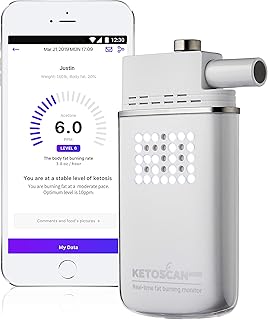
Ketoscan V2 mini provides a non-invasive, quick, and convenient alternative to blood or urine ketone tests. The interface is straightforward, allowing users to easily understand their results.
Pros:
- Non-invasive breath ketone measurement
- No recurring costs for test strips
- Bluetooth connectivity and app integration
- Highly accurate and consistent readings.
Cons:
- Higher initial cost compared to blood ketone meters
- Requires self diagnosis test before each measurement
- Only measures ketones not glucose.
Ketoscan mini is a highly portable breath acetone analyzer that measures the ketone level and calculates body fat burning rate in your exhaled breath.
No need to prick your fingers. Just blow into the device for 3 seconds.
Record and monitor your acetone levels and weight daily, weekly and on a monthly basis. Also Leave comments, and track your calories with photos of the food that you ate.
Check your results on both the device and the mobile app. Even without the mobile app., the device displays your results in PPM(Parts Per Million) on the built in white dot matrix display.
With the result you can determine your body fat burning rate as well as your optimal ketosis state. It will help you plan your nutrition and fitness regime.
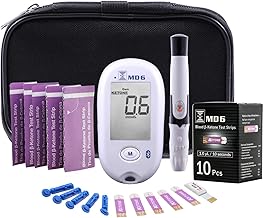
The Bruno MD6 is a versatile device that goes beyond just ketone and glucose testing, offering hemoglobin measurement as well.
Pros:
- Measures ketones, glucose, and hemoglobin
- Large, color touchscreen display
- Stores up to 1000 test results
- Comes with a carrying case for portability
Cons:
- Higher price point compared to some competitors
- Test strips can be expensive
- Some users find the interface less intuitive
The Bruno MD6’s multi-functionality makes it an attractive option for those who want comprehensive health monitoring in one device. Its large storage capacity and color display are nice touches, though they come at a premium price.
The ability to measure hemoglobin alongside ketones and glucose is particularly useful for athletes or those with certain health conditions. The device’s large storage capacity allows for extensive data tracking, which can be valuable for identifying long-term trends.
While the Bruno MD6 offers advanced features, some users find the interface less intuitive than simpler devices. The higher cost of both the device and test strips may be a barrier for some, but those who value the extra functionality often find it worthwhile.
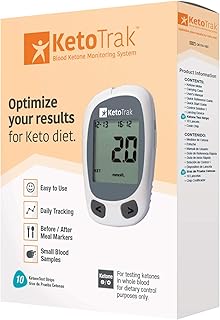
KETOTRAK combines modern design with practical functionality, offering a sleek ketone and glucose meter with Bluetooth connectivity.
Pros:
- Bluetooth connectivity for easy data tracking
- Measures both ketones and glucose
- Compact and sleek design
- Affordable test strips
Cons:
- Initial cost of the device is relatively high
- Some users report connectivity issues with the app
- Limited availability in some regions
KETOTRAK’s strength comes from its modern design and connectivity features. For tech-savvy users who prioritize data tracking and analysis, this device offers a compelling package.
The accompanying app provides detailed insights and allows for easy sharing of data with healthcare providers or nutrition coaches. Many users appreciate the sleek, modern design of the KETOTRAK, finding it more aesthetically pleasing than traditional medical devices.
While the initial cost of the device is on the higher end, the affordable test strips help balance out the long-term expense. Some users have reported occasional connectivity issues with the app, but regular software updates have improved the overall user experience.
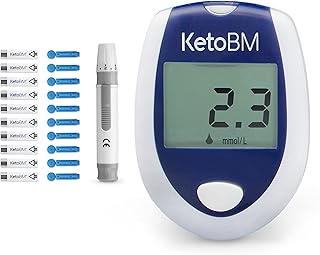
KetoBM provides a no-frills, straightforward approach to ketone and glucose testing.
Pros:
- User-friendly interface
- Measures both ketones and glucose
- Affordable test strips
- Compact and portable design
Cons:
- Limited data storage capacity
- No Bluetooth connectivity
- Some users report inconsistent readings
While it may lack some of the advanced features of higher-ranked devices, KetoBM’s simplicity and affordability make it a solid choice for those who prefer a straightforward testing experience.
The device’s user-friendly interface is particularly appealing to those new to ketone testing or those who prefer a no-fuss approach. Many users appreciate the compact design, which makes it easy to carry in a pocket or small bag.
The affordable test strips are a significant advantage, especially for those on a tight budget. While some users have reported occasional inconsistencies in readings, most find the KetoBM sufficiently accurate for general ketone monitoring.
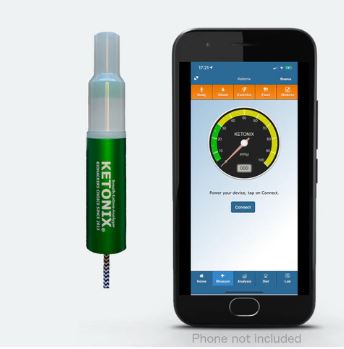
Another breath-based ketone analyzer, Ketonix offers a durable, reusable option for those who prefer non-invasive testing.
Pros:
- Non-invasive breath ketone measurement
- No recurring costs for test strips
- USB connectivity for easy charging and data transfer
- Durable construction
Cons:
- Less precise than blood ketone measurements
- Higher initial cost compared to blood ketone meters
- Cannot measure blood glucose
- Some users find the breathing technique challenging
Ketonix’s unique selling point is its one-time cost and durability. For those committed to long-term ketone monitoring who don’t mind sacrificing some precision, it can be a cost-effective choice over time.
The device’s USB connectivity allows for easy charging and data transfer to a computer, where users can analyze their results using the provided software. Many users appreciate the environmental benefits of a reusable device that doesn’t require disposable test strips.
While the breathing technique can take some practice to master, many users find it becomes second nature over time. The Ketonix may be less precise than blood ketone meters, but it provides a good general indication of ketosis levels, especially when used consistently.
9. Medilax Ketone Monitor and Glucose Meter Kit
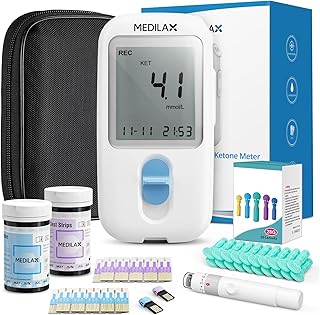
Medilax offers an affordable option for those looking to measure both ketones and glucose.
Pros:
- Affordable device and test strips
- Compact and lightweight design
- Quick results in 10 seconds
- Measures both ketones and glucose
Cons:
- Limited brand recognition and user reviews
- No Bluetooth connectivity or app integration
- Some users report accuracy issues
While Medilax may not have the brand recognition of some competitors, its affordability and dual functionality make it worth considering for budget-conscious buyers.
The device’s compact and lightweight design makes it easy to carry, and many users appreciate the quick 10-second result time. The ability to measure both ketones and glucose in one device is a convenient feature, especially at this price point.
However, the limited user reviews and brand recognition make it difficult to gauge long-term reliability. Some users have reported accuracy issues, suggesting that the Medilax may be better suited for general monitoring as opposed to precise medical management.
10. YiLianKang Blood Ketone Monitoring System
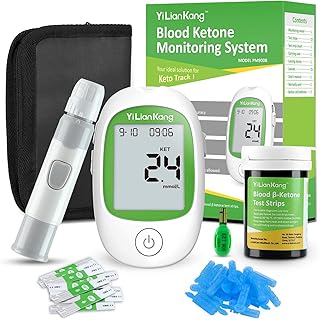
Rounding out our list is YiLianKang, another budget-friendly option for ketone and glucose testing.
Pros:
- Very affordable device and test strips
- Compact and lightweight design
- Measures both ketones and glucose
- Quick results in 5 seconds
Cons:
- Limited brand recognition and user reviews
- No Bluetooth connectivity or app integration
- Some users report accuracy concerns
Similar to Medilax, YiLianKang offers an accessible entry point for those new to ketone testing or on a tight budget. However, its limited user feedback and potential accuracy issues place it at the bottom of our list.
The device’s affordability is its main selling point, with both the meter and test strips being significantly cheaper than many competitors. The compact design and quick 5-second result time are appreciated by many users.
However, the lack of Bluetooth connectivity and app integration limits its usefulness for those who want to track their data digitally. The limited brand recognition and user reviews make it difficult to assess long-term reliability and customer support.
Key Takeaways
- Blood ketone meters generally offer higher accuracy than breath analyzers.
- Consider both the initial cost of the device and the ongoing expense of test strips.
- Bluetooth connectivity and app integration can greatly enhance data tracking and analysis.
- Non-invasive breath ketone measurers may be preferable for those uncomfortable with blood sampling.
- Accuracy, ease of use, and customer support are crucial factors in choosing the right ketone measurer.
People Have Also Asked The Following Questions
What is the most accurate way to measure ketones?
Blood ketone meters are generally considered the most accurate method for measuring ketone levels. They provide a direct measurement of beta-hydroxybutyrate (BHB), the primary ketone body in the blood.
How often should I measure my ketone levels?
The frequency of ketone measurements depends on your goals and health status. For general ketogenic diet monitoring, once or twice a week may be enough.
Those managing medical conditions or optimizing athletic performance may need to test more often.
Can I use a glucose meter to measure ketones?
Standard glucose meters cannot measure ketones. However, some dual-function devices can measure both glucose and ketones using different test strips.
Are breath ketone meters as accurate as blood ketone meters?
Breath ketone meters are generally less accurate than blood ketone meters. They measure acetone levels in the breath, which correlate with blood ketone levels but can be influenced by various factors.
What ketone level shows nutritional ketosis?
Nutritional ketosis is typically defined as blood ketone levels between 0.5 and 3.0 mmol/L. However, optimal levels may vary depending on individual goals and health status.
Can urine strips effectively measure ketones?
Urine strips can detect the presence of ketones but are less accurate for measuring ketone levels. They measure excess ketones excreted in urine, which may not accurately reflect current blood ketone levels.
How do ketone levels change throughout the day?
Ketone levels can fluctuate throughout the day based on factors such as diet, exercise, and fasting duration. Many people experience higher ketone levels in the morning and lower levels after meals.
Are higher ketone levels always better?
Higher ketone levels are not necessarily better for everyone. While some individuals aim for higher levels for therapeutic purposes, moderate ketosis (0.5-3.0 mmol/L) is generally sufficient for most people following a ketogenic diet.
Can medications affect ketone readings?
Yes, certain medications can affect ketone readings. For example, some diabetes medications can increase ketone levels.
Always ask with a healthcare provider about potential interactions between medications and ketone measurements.
How long does it take to enter ketosis?
The time it takes to enter ketosis varies among people. Generally, it can take anywhere from 2-7 days of following a strict ketogenic diet to enter nutritional ketosis.
Factors such as metabolism, activity level, and previous diet can influence this timeline.
This post may contain affiliate links. If you click on one and make a purchase, I may earn a commission at no additional cost to you. Rest assured, I only recommend products or services I believe will provide value to my readers.
